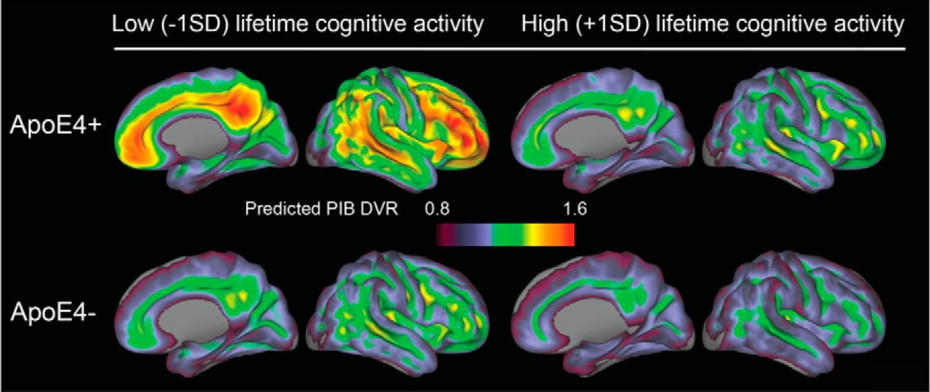Genetic factors and AD pathology and clinical expression
Background
Alzheimer’s disease (AD) heritability is estimated to be around 60% (Gatz et al. 2006). Apoliprotein E4 (ApoE4), is the main genetic risk factor for sporadic AD. Interestingly, people with ApoE4 don’t always develop AD, and some people without ApoE4 could still develop the disease. Recently, several other candidate genes have been proposed as being significant determinants of one’s likelihood of developing AD. In collaboration with Dr. Poirier, these other genes are currently being investigated in our laboratory.
Ongoing Research
- Investigating genetic risk and protective factors related to Aβ and tau accumulation.
- Investigating genetic risk and protective factors that can modulate the relationship between Aβ and tau proteins, brain integrity and cognitive functions.
In a previous study, we found that higher lifetime cognitive activity forestalls Alzheimer’s pathology in APOE ε4 carriers. This finding, published in The Journal of Neuroscience, suggests that increasing cognitive activity (particularly in early and middle age) can be an efficient target for Alzheimer prevention [pubmed, PDF].
Press recognition: Alzforum

Figure: Cortical PIB retention is only increased in ApoE4 carriers with low lifetime cognitive activity. ApoE4 carriers with high lifetime cognitive activity present PIB retention similar to non-ApoE4 carriers.
DISCLAIMER: The documents distributed here have been provided as a means to ensure timely dissemination of scholarly and technical work on a noncommercial basis. Copyright and all rights therein are maintained by the authors or by other copyright holders, notwithstanding that they have offered their works here electronically. It is understood that all persons copying this information will adhere to the terms and constraints invoked by each author’s copyright and or other publishers (as appropriate). These works may not be reposted without the explicit permission of the copyright holder.
